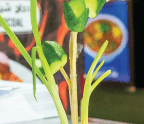JAN MORRIS
Day 17
I have always rather envied the poet Ovid, who was banished from Rome by the emperor Augustus, you may remember, to a remote place called Tomis on the shores of the Black Sea. There he died, ten years later, and his exile has gone into legend and into art—Turner’s commemoration of his banishment is as poignantly dramatic as The Fighting Temeraire. Ovid wrote prodigiously during his banishment, and although his work was mostly sad and often complaining, as a remote member of the same fraternity I find it hard to commiserate with him. There are worse predicaments, it seems to me, than enforced residence in a house on the Black Sea, writing lyric poetry for the rest of your life.
Tomis is now the hefty Romanian port of Constanţa, not a bad sort of place at all, with a big nineteenth-century statue of Ovid in a square named for him, but my own Tomis is our garden yard at Llanystumdwy, Wales. It is Elizabeth’s domain: she created it and attends it still. I just laze about in it, thinking up compositions, Ovid-like. It is a patch of gravel overlooked on three sides by a tangled mass of trees and bushes—a fir or two, a horse chestnut, rhododendrons, bushes of camellia interspersed with blackberry brambles, shrubs I don’t know the names of, primroses, bluebells, and snowdrops when the season allows, miscellaneous weeds here and there that Elizabeth heroically resists. The whole ensemble is presided over by a splendid old sycamore, dominating the skyline.
I must not make it sound too grand. There is nothing grand about it. It is essentially homely, and its fascination for me is that it is not just home for us, but for myriad other creatures cohabitating it! Half a century ago I bought a wonderful book, The Living House by George Ordish, which told me that at that time his house probably accommodated two hundred residential spiders, besides miscellaneous colonies of beetles, fleas, moths, cockroaches, and flies. I love to think about the livestock similarly living, eating, fighting, procreating, and dying in and around the yard all around me, as I laze there in the sunshine and Elizabeth deals with weeds.
Not long ago there was certainly more of it, but shifting ecology has robbed us of the grass snakes, glowworms, and occasional lizards that used to frequent the place—even the toads seem scarcer. Never mind, butterflies visit me as I laze, bees and wasps buzz around, beetles and caterpillars make for the gravel, sometimes a handsome dragonfly comes up from the river or a robin hops in. A sudden scuffle in the bushes means that a clumsy squirrel or two are in there—and yes, there they are leaping erratically from branch to branch. More often a crow or a blackbird swoops or cackles among the trees, and a wood pigeon monotonously serenades its mate. Sometimes coveys
You’re reading a preview, subscribe to read more.
Start your free 30 days

